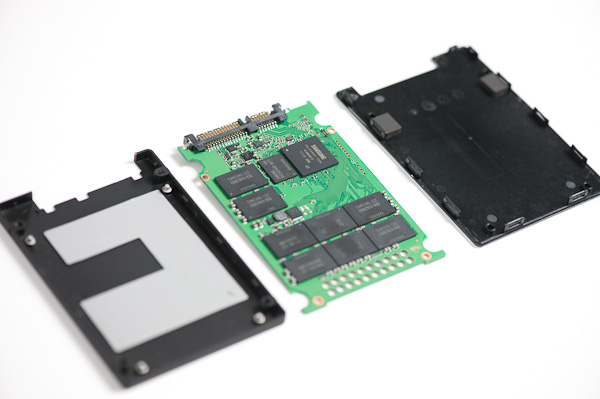The Samsung SSD 830 Review
by Anand Lal Shimpi on September 24, 2011 1:02 AM EST- Posted in
- SSDs
- Storage
- Samsung
- pm830
- Samsung SSD 830
Final Words
The Samsung SSD 830 isn't the fastest drive we've tested, but it generally produces results in the upper echelon of high-end SSDs. If Samsung is able to at least match the current pricing of the SSD 470 and continue its excellent track record in drive reliability, I can see the 830 being a fine recommendation for pretty much any desktop user. The power consumption numbers are a bit troubling but as I alluded to earlier, we are testing a ridiculously high capacity unit - it remains to be seen how smaller capacity drives fare in the power charts.
It's amazing to see Samsung come so far in the enthusiast space. From a drive that I simply wouldn't recommend to building a downright competitive solution backed by a near flawless track record. What I'm even more excited about with this drive is the fact that it will likely find its way into a number of high end OEM systems over the next year. Although I'm glad that more manufacturers are offering SSDs with their systems, I'm often disappointed by their controller selection. If the PM830 is included in the option pool for the next round of design wins however, I'll be much more comfortable recommending that users tick the vendor-supplied SSD option (*cough* Apple).
I've had the SSD 830 for less than a week and in my limited testing it does seem to do very well. I'll be hammering on it for the weeks and hopefully months to come but as I've already mentioned, Samsung's reputation for reliability rivals that of Intel. Despite the praise though I do wish Samsung would more significantly address one of its long standing issues. I honestly believe Intel has the right idea of performing as much garbage collection in real time as possible. Very few (if any) desktop workloads require > 100MB/s of small file random writes, I would gladly trade some performance there for higher numbers in a fragmented state. Idle time garbage collection just seems like an ineffecient way to do things, you end up dealing with very high write amplification and potentially harm the overall user experience when you're not idle as a result.
In the end I welcome the 830 as another high-speed option in the 6Gbps space. We have a number of great performers to choose from, but what matters most today is reliability and solid validation testing. The Samsung SSD 830 may be able to join Intel's SSD 510 in delivering both of those without sacrificing performance.











99 Comments
View All Comments
Herp Derpson - Saturday, September 24, 2011 - link
Anand, it would be very interesting to read about hardware AES encryption in SSDs - how do you use it and how does it affects performance.juhatus - Saturday, September 24, 2011 - link
Yeap, I heard that AES basicly kills all-compressing Sandforce's?Maybe test with win7's bitlocker?
Ryan Smith - Saturday, September 24, 2011 - link
Only if you leave encryption up to the OS. With a SF SSD you should be leaving it up to the drive - AES encryption is basically free on those drives, they just run the cypher after dedupe and compression.zanon - Saturday, September 24, 2011 - link
There are plenty of valid reasons though not to leave encryption up to the drive, ranging from a need for other features/management (like multiple factors) to just plain not trusting encryption where no source review or updates are available. Perhaps most importantly is the simple observation that it's probable that the vast majority of FDE users are using either software (Truecrypt/PGP or whatever) or OS level solutions.Given that, I think it's a valid situation to consider, along with filesystem-level compression.
docbones - Monday, October 10, 2011 - link
I would love to see a benchmark article on whole disk encryption across drive types. (especially interested in how does the seagate hybrids do)iwodo - Saturday, September 24, 2011 - link
was it tested with new firmware?Anand Lal Shimpi - Saturday, September 24, 2011 - link
The initial graphs used the older fw but after realizing the mistake I updated the numbers to the latest FW0009 numbers, so yes :)Take care,
Anand
Beenthere - Saturday, September 24, 2011 - link
I'd be interested in a number of SSDs if they ever sort out the reliability and compatibility issues. I had hoped by now this would have happened but clearly it has not. This is like OJT for SSD makers I guess.soliozuz - Saturday, September 24, 2011 - link
It's funny you mentioned that because I think you just jinxed both companies. it seems that Apple will no longer be relying on Samsung for it's Nand Flash and etc. Now the reasons as to why they would dump someone as reliable as Samsung is beyond me.Source: http://www.techspot.com/news/45591-apple-decreasin...
In regards to the SSD, I must admit, as great of a thing they have done with this drive, I kind of was left expecting more. Samsung made a statement last year releasing a SATA II SSD especially with the kind of power consumption they had on it. I think that's key for future products.
jwilliams4200 - Saturday, September 24, 2011 - link
If you read the source article (Digitimes), it is stated that Apple is apparently diversifying its suppliers from Samsung because of patent disputes with Samsung.